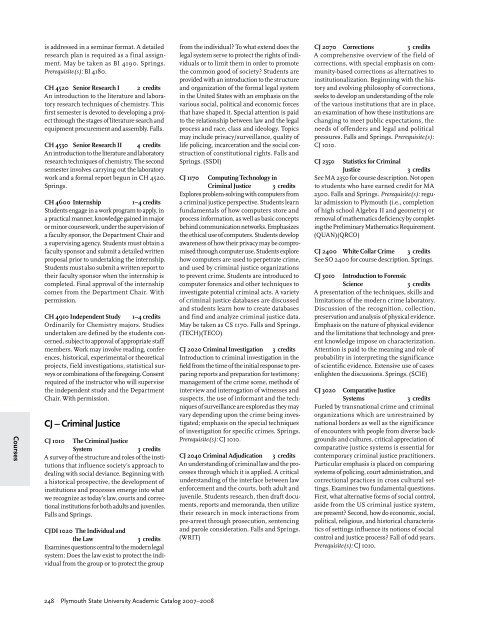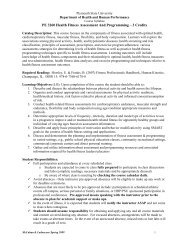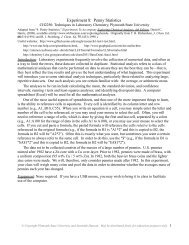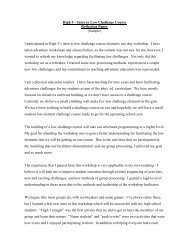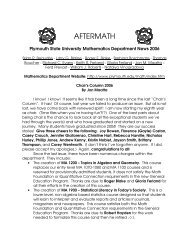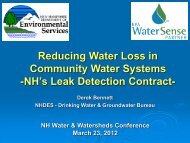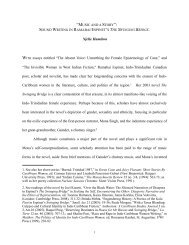2007-2008 Undergraduate Academic Catalog - Plymouth State ...
2007-2008 Undergraduate Academic Catalog - Plymouth State ...
2007-2008 Undergraduate Academic Catalog - Plymouth State ...
- No tags were found...
You also want an ePaper? Increase the reach of your titles
YUMPU automatically turns print PDFs into web optimized ePapers that Google loves.
Coursesis addressed in a seminar format. A detailedresearch plan is required as a final assignment.May be taken as BI 4190. Springs.Prerequisite(s): BI 4180.CH 4520 Senior Research I 2 creditsAn introduction to the literature and laboratoryresearch techniques of chemistry. Thisfirst semester is devoted to developing a projectthrough the stages of literature search andequipment procurement and assembly. Falls.CH 4530 Senior Research II 4 creditsAn introduction to the literature and laboratoryresearch techniques of chemistry. The secondsemester involves carrying out the laboratorywork and a formal report begun in CH 4520.Springs.CH 4600 Internship 1–4 creditsStudents engage in a work program to apply, ina practical manner, knowledge gained in majoror minor coursework, under the supervision ofa faculty sponsor, the Department Chair anda supervising agency. Students must obtain afaculty sponsor and submit a detailed writtenproposal prior to undertaking the internship.Students must also submit a written report totheir faculty sponsor when the internship iscompleted. Final approval of the internshipcomes from the Department Chair. Withpermission.CH 4910 Independent Study 1–4 creditsOrdinarily for Chemistry majors. Studiesundertaken are defined by the students concerned,subject to approval of appropriate staffmembers. Work may involve reading, conferences,historical, experimental or theoreticalprojects, field investigations, statistical surveysor combinations of the foregoing. Consentrequired of the instructor who will supervisethe independent study and the DepartmentChair. With permission.CJ – Criminal JusticeCJ 1010 The Criminal JusticeSystem3 creditsA survey of the structure and roles of the institutionsthat influence society’s approach todealing with social deviance. Beginning witha historical prospective, the development ofinstitutions and processes emerge into whatwe recognize as today’s law, courts and correctionalinstitutions for both adults and juveniles.Falls and Springs.CJDI 1020 The Individual andthe Law3 creditsExamines questions central to the modern legalsystem: Does the law exist to protect the individualfrom the group or to protect the groupfrom the individual? To what extend does thelegal system serve to protect the rights of individualsor to limit them in order to promotethe common good of society? Students areprovided with an introduction to the structureand organization of the formal legal systemin the United <strong>State</strong>s with an emphasis on thevarious social, political and economic forcesthat have shaped it. Special attention is paidto the relationship between law and the legalprocess and race, class and ideology. Topicsmay include privacy/surveillance, quality oflife policing, incarceration and the social constructionof constitutional rights. Falls andSprings. (SSDI)CJ 1170 Computing Technology inCriminal Justice 3 creditsExplores problem-solving with computers froma criminal justice perspective. Students learnfundamentals of how computers store andprocess information, as well as basic conceptsbehind communication networks. Emphasizesthe ethical use of computers. Students developawareness of how their privacy may be compromisedthrough computer use. Students explorehow computers are used to perpetrate crime,and used by criminal justice organizationsto prevent crime. Students are introduced tocomputer forensics and other techniques toinvestigate potential criminal acts. A varietyof criminal justice databases are discussedand students learn how to create databasesand find and analyze criminal justice data.May be taken as CS 1170. Falls and Springs.(TECH)(TECO)CJ 2020 Criminal Investigation 3 creditsIntroduction to criminal investigation in thefield from the time of the initial response to preparingreports and preparation for testimony;management of the crime scene, methods ofinterview and interrogation of witnesses andsuspects, the use of informant and the techniquesof surveillance are explored as they mayvary depending upon the crime being investigated;emphasis on the special techniquesof investigation for specific crimes. Springs.Prerequisite(s): CJ 1010.CJ 2040 Criminal Adjudication 3 creditsAn understanding of criminal law and the processesthrough which it is applied. A criticalunderstanding of the interface between lawenforcement and the courts, both adult andjuvenile. Students research, then draft documents,reports and memoranda, then utilizetheir research in mock interactions frompre-arrest through prosecution, sentencingand parole consideration. Falls and Springs.(WRIT)CJ 2070 Corrections3 creditsA comprehensive overview of the field ofcorrections, with special emphasis on community-basedcorrections as alternatives toinstitutionalization. Beginning with the historyand evolving philosophy of corrections,seeks to develop an understanding of the roleof the various institutions that are in place,an examination of how these institutions arechanging to meet public expectations, theneeds of offenders and legal and politicalpressures. Falls and Springs. Prerequisite(s):CJ 1010.CJ 2350 Statistics for CriminalJustice3 creditsSee MA 2350 for course description. Not opento students who have earned credit for MA2300. Falls and Springs. Prerequisite(s): regularadmission to <strong>Plymouth</strong> (i.e., completionof high school Algebra II and geometry) orremoval of mathematics deficiency by completingthe Preliminary Mathematics Requirement.(QUAN)(QRCO)CJ 2400 White Collar Crime 3 creditsSee SO 2400 for course description. Springs.CJ 3010 Introduction to ForensicScience3 creditsA presentation of the techniques, skills andlimitations of the modern crime laboratory.Discussion of the recognition, collection,preservation and analysis of physical evidence.Emphasis on the nature of physical evidenceand the limitations that technology and presentknowledge impose on characterization.Attention is paid to the meaning and role ofprobability in interpreting the significanceof scientific evidence. Extensive use of casesenlighten the discussions. Springs. (SCIE)CJ 3020 Comparative JusticeSystems3 creditsFueled by transnational crime and criminalorganizations which are unrestrained bynational borders as well as the significanceof encounters with people from diverse backgroundsand cultures, critical appreciation ofcomparative justice systems is essential forcontemporary criminal justice practitioners.Particular emphasis is placed on comparingsystems of policing, court administration, andcorrectional practices in cross cultural settings.Examines two fundamental questions.First, what alternative forms of social control,aside from the US criminal justice system,are present? Second, how do economic, social,political, religious, and historical characteristicsof settings influence its notions of socialcontrol and justice process? Fall of odd years.Prerequisite(s): CJ 1010.248 <strong>Plymouth</strong> <strong>State</strong> University <strong>Academic</strong> <strong>Catalog</strong> <strong>2007</strong>–<strong>2008</strong>


